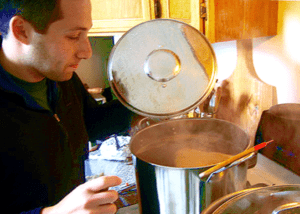Whether you are new at home wine making or an old pro at home brewing your own beers, you have likely faced the challenge of finding the best supplier for all of your current and prospective future growth needs.
Basic Needs
The list of basic needs for brewing is quite long.
- Steel Boiling Pot. The boiling pot you purchase must comfortably hold at least three gallons. Bigger is better in this case. Use only high-quality boiling pots that are made of ceramic-coated steel, stainless steel or aluminum.
- Two Fermenters with Airlocks. It is best to have two fermenters so that one can act as a bottling bucket. A six-gallon food-grade plastic type is recommended for early beginners. Also available are glass carboys that commonly come in three, five and six and a half-gallon sizes.
- Siphon with Bottle Filler. Siphons are available in many different configurations. However, they commonly consist of clear plastic tubing with a racking cane. They can also have bottle fillers. A bottle filler is most often made of plastic or metal tubing with a spring-loaded valve for filling your beer or wine bottles.
- Bottle Capper. There are different styles of bottle cappers available. You will need to decide between a bench-style or hand capper. Although bench cappers are more flexible and will be required to create champagne bottle caps, they are definitely more expensive.
- Bottle Caps. Oxygen and standard absorbing crown caps are the choices in bottle caps.
- Large Stirring Spoon. You will need a food-grade plastic paddle or stirring spoon for the wort during the boiling process.
- Bottle Brush. Used bottles should be thoroughly cleaned with a long-handled nylon bottle brush.
- Thermometer. Make sure the thermometer you select can be safely immersed during the boiling and wort process. It should have a range of approximately 40°F to 180°F.
- Hydrometer. The hydrometer can measure the specific gravity between pure water and water that has had sugar dissolved in it. A hydrometer is definitely required when creating beers from scratch.
Cost to Start Making Wine or Beer at Home
Considering all the above requirements, it is still not as expensive as you may believe to begin making your own wine or beer at home. Expect to spend anywhere from $100 to $200 at Adventures in Homebrewing for the first shot that includes buying the equipment. Subsequent brewings for five to six gallons of wine should cost anywhere from $50 to $200 depending on the quality and rarity of ingredients used.
Most home brewers have found that the experience, as well as the options for customization in their beer or wine, is sufficient reward for the brewing process. Home brewers also commonly market their own products locally with unexpectedly good results since even smaller grocers now cater to microbreweries and other open market opportunities. The affordable investment into a home brewing kit for wine or beer may even pay for itself in your very first batch as long as you are sure to purchase the most affordable brewing equipment for your needs at a reputable supplier such as Adventures in Homebrewing.

